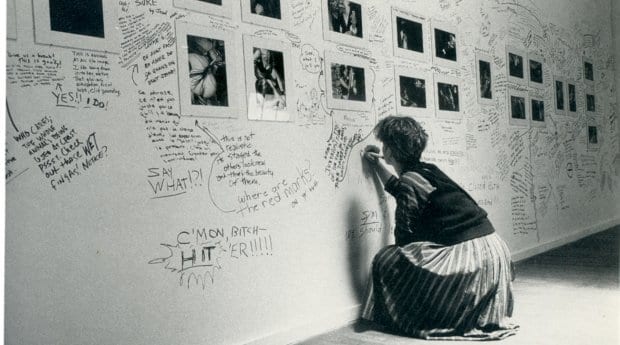What was the highlight of my Pride in Vancouver?
It wasn’t the Davie Street Party, though I certainly appreciate its cage-less celebration, so many years in the making.
It wasn’t the Pride parade, though I appreciate the effort poured into its execution, despite rumblings of turmoil and last-minute resignations in the background.
It wasn’t the mandatory trans pledge that all entries had to sign, though I stand by my appreciation of the Pride Society’s determination to re-inject meaning and activism into this year’s parade.
The board’s tactics may have been clumsy as it grappled with the meaning of mandatory, but I appreciate the Society’s resolve to make the pledge count, and its willingness to grapple with — and ultimately strengthen — its stance when challenged.
To me, Pride was never meant to welcome external groups who crave the parade photo op but in daily life are less than keen to fully embrace us, or to stand by us in the face of discrimination.
So I appreciate the trans pledge and the healthy debate it inspired within our community, but that still wasn’t the highlight of my Pride this year.
My Pride soared this year at the Queer Arts Festival and its brilliant, layered tribute to Kiss & Tell.
From its edgy opening art party to its varied exhibits — each exploring facets of where we draw the line today around sex, violence and freedom of expression — the festival immediately created an atmosphere conducive to interaction and debate. Just like the original Drawing The Line exhibit by the Kiss & Tell collective 25 years ago.
The beauty of Kiss & Tell’s groundbreaking exhibit wasn’t just the unprecedented celebration of lesbian sexual imagery that it presented, but the discussion it inspired as women were encouraged to draw their lines directly on the walls surrounding the images. And they did; wherever the exhibit toured, women engaged with the photos, challenged their own comfort levels, and created an important conversation that needed to take place.
In the context of the late 1980s “porn wars” — where some feminists equated all female sexual imagery with violence and oppression and tried very hard to stifle it — Kiss & Tell’s unabashed embracing of lesbian sex, and its invitation to discuss its imagery, broke down rigid positions and built bridges of understanding.
“I have waited 25 years to see this show,” Rachel Iwaasa, the Queer Arts Festival’s director of operations, told a very appreciative, mostly lesbian, audience spanning several generations at the Kiss & Tell reunion on July 25.
The collective’s Drawing the Line postcard book “changed my life,” Iwaasa said. “I literally got the sense that my life could be more than I had ever imagined.”
It was a sentiment repeated many times throughout the night, and captured in the sustained standing ovation given to Kiss & Tell’s members, Lizard Jones, Susan Stewart and Persimmon Blackbridge.
The following afternoon a group of us joined artistic director SD (Shaira) Holman for a tour of the festival’s artwork and a wonderfully interactive salon, which I had the privilege to co-host. The topic: where we draw the lines today, and where “trigger warnings” — increasingly ubiquitous in social media — fit in.
“My issue with trigger warnings is they’re used as a form of censorship,” said Jonny Sopotiuk, whose provocative video “Don’t Fuck, Don’t Kill” is on display at the festival.
Artist Amy Dame suggested the use of “content notes” rather than warnings to acknowledge that some people may want to come back to certain ideas, or skip them altogether.
Filmmaker Aerlyn Weissman pointed to an “endless list of great writing and great artists who have described sexual torture.”
“This is the way we confront violence,” she said. We confront things that upset and disturb us by engaging with works of art.
“I don’t want to be deprived of the opportunity to be changed by engaging with that work of art,” she said. “I want to be taken somewhere I didn’t expect to go.”
Iwaasa said she’s uneasy with trigger warnings — and especially the backlash frequently unleashed against people who don’t use them.
She acknowledged the desire to “create gentleness, safety” and to “make the world safer for those we love” — but isn’t that reminiscent of the porn wars that tried to squash the very imagery that Kiss & Tell celebrated?
“I worry that we’re creating in our communities a renewed shutting down, and censoring what we disagree with,” she said.
“What triggers me is colonialism,” said Aiyyana Maracle, a First Nations transsexual woman whose courageous performance art on opening night stopped most people in their tracks. Wearing nothing but red body paint and holding a long feather, Maracle invited people to draw their lines directly onto her skin.
Colonialism may trigger her, but that doesn’t mean she supports trigger warnings, she said. She, too, thinks they “place a form of self-censorship on us.”
“To me it comes down to personal responsibility,” she said. “If you don’t want to see my tits, walk away.”
Robin Perelle is the managing editor of Daily Xtra in Vancouver. You can reach her at robin.perelle@dailyxtra.com or on Twitter @RobinPerelle
The Queer Arts Festival runs until Friday, Aug 7, 2015, at the Roundhouse Community Centre, 181 Roundhouse Mews, in Vancouver.

 Why you can trust Xtra
Why you can trust Xtra


